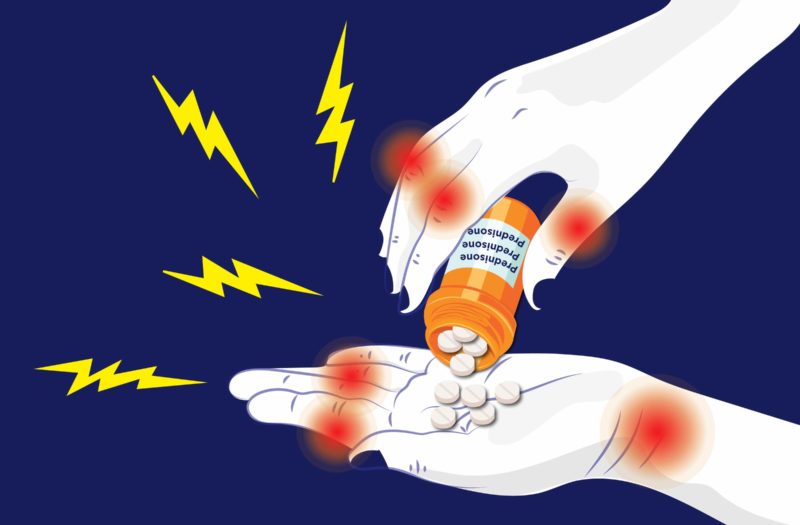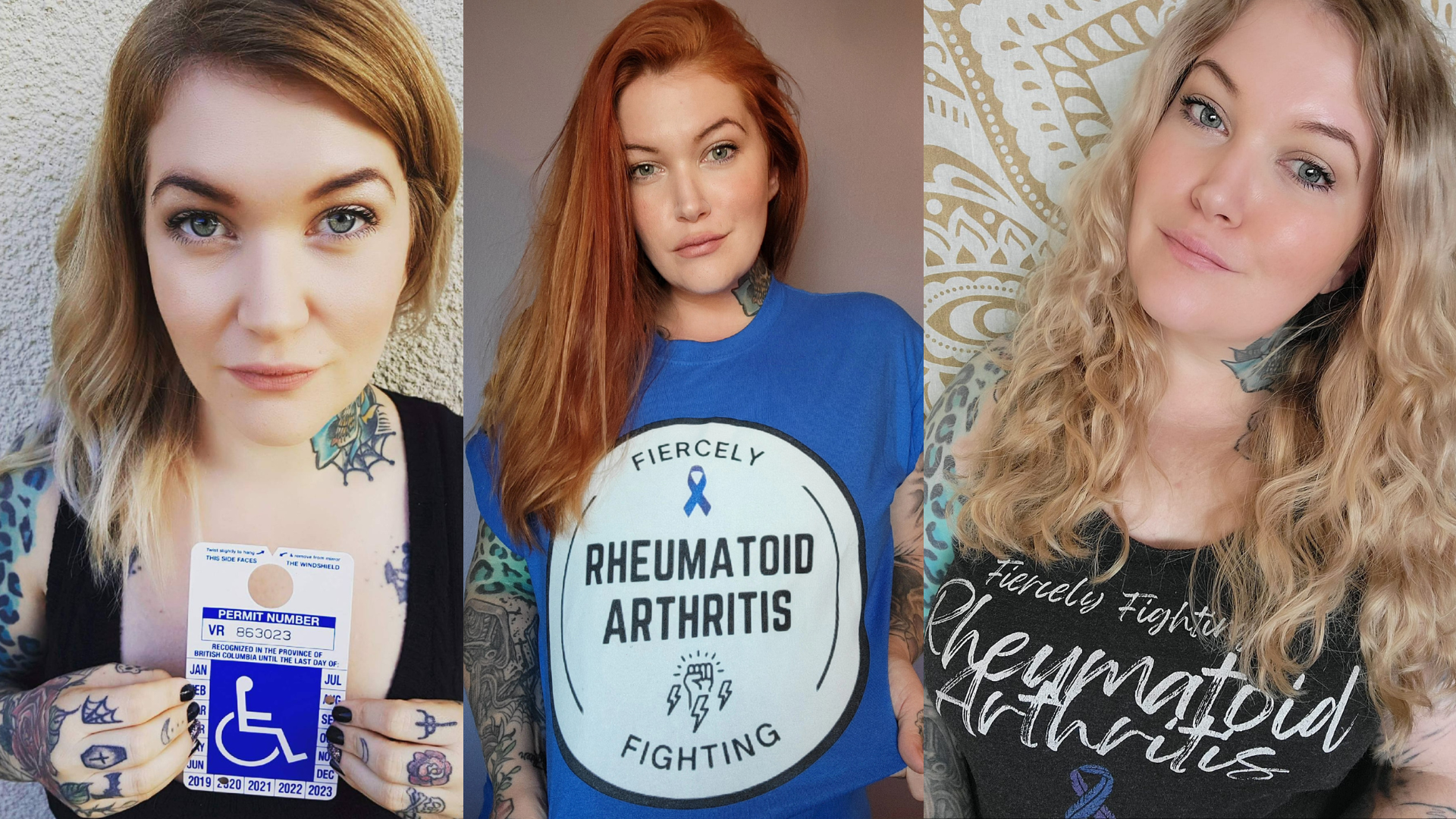Learn more about our FREE COVID-19 Patient Support Program for chronic illness patients and their loved ones.
This has been reviewed and updated as of May 30, 2020.
Prednisone — a corticosteroid that’s used by many people with inflammatory arthritis, asthma, chronic pain, and a variety of other conditions — has some major pluses and minuses. On the pro side, this drug tends to quickly and effectively relieve symptoms of pain and inflammation.
Some patients, in fact, feel so good when they’re taking it that they start using a higher dose than what was prescribed by their doctor (though that’s not advisable), says rheumatologist Joseph E. Huffstutter, MD, partner with Arthritis Associates in Hixson, Tennessee.
Unfortunately, taking more than your recommended dose can have some serious downsides; even taking a doctor-approved dose for an extended period can be problematic. Corticosteroids like prednisone have a laundry list of potential side effects, including high blood pressure; high blood sugar; glaucoma; issues with sleep, mood, and memory; weight gain; fluid retention and swelling; osteoporosis; and more.
Side effects tend to increase with higher doses and longer duration of use.
Another common side effect of corticosteroids like prednisone is increased risk of infections, including bacterial, fungal, and viral infections. This is particularly important to understand right now in light of the current COVID-19 crisis.
A May 2020 editorial in the Journal of Clinical Endocrinology & Metabolism cautioned that people who regularly take oral steroids should be considered higher risk for COVID-19 and may be more prone to developing complications.
Additionally, preliminary data, presented at the American College of Rheumatology’s May 2020 virtual State-of-the-Art Clinical Symposium, found that people on moderate or high doses of steroids who developed COVID-19 were more likely than those not using these drugs (or taking lower doses) to develop severe symptoms.
Is Prednisone Immunosuppressing?
A new report, published in the journal Gastroenterology, found that inflammatory bowel disease (Crohn’s and ulcerative colitis) patients who use steroid medication are more apt to develop complications of COVID-19 compared to those who don’t use these drugs.
“Prednisone is a broad immunosuppressant,” Dr. Huffstutter explains. Unlike targeted medications — such as TNF inhibitors and interleukin inhibitors — which home in on specific types of inflammatory molecules that are over-expressed in people with chronic autoimmune conditions, prednisone works to lower inflammation throughout the entire body.
It does that by imitating the corticosteroids that are naturally produced by the adrenal glands. When you put a synthetic corticosteroid like prednisone into your body, your adrenal glands stop producing their own supply. The resulting lower level of inflammation throughout your body is what helps relieve symptoms in joints or other trouble spots. But it may also end up suppressing your immune system function.
“There is good data that prednisone makes you more susceptible to a variety of infections, maybe even more so than biologics and methotrexate,” says Dr. Huffstutter.
Of course, as with other medications, the dose of corticosteroids matters a lot. At high enough doses, such as those sometimes used in chemotherapy, prednisone will actually kill off lymphocytes, a type of white blood cell. “Prednisone is very dose-dependent, and 5 mg is very different than 40 mg,” says Vinicius Domingues, MD, a rheumatologist in Daytona Beach, Florida. “You’re going to have far more impairment if you’re taking higher doses.”
The Way You Take Prednisone Affects Immunosuppression
The method of delivery — or the way you take — prednisone matters too. People who use corticosteroids systemically (meaning orally or via injection) have a higher risk of developing immune system side effects compared to those who use the drug topically (such as for skin problems like eczema) or through an inhaler or nasal spray (such as for respiratory issues like asthma).
The more your immune system is suppressed, the greater your risk of contracting a contagious infection, including coronavirus. However, more research is needed on how taking corticosteroids specifically affects risks related to COVID-19.
Advice for People Currently Taking Corticosteroids for Chronic Conditions
First of all, do not stop taking any of your regular medications without first talking to your doctor.
Recently published clinical guidance from the American College of Rheumatology on treating patients during the coronavirus pandemic recommends using the “lowest effective dose [of corticosteroids] to control underlying rheumatic disease.”
If your health is good at the moment — meaning, the condition for which you’re taking prednisone seems well-controlled — your doctor might discuss with you the idea of starting to wean off prednisone, especially if you’re taking higher dosages.
You and your doctor should work together to see whether you should remain on your current dosage of prednisone or attempt to taper it down.
Corticosteroids are generally not recommended for long-term use anyway. The additional threat of COVID-19 might be a good reason to consider slowly stopping it.
Dr. Domingues adds that people who are on a very low dose of prednisone, perhaps 5 mg, should not be terribly concerned about the drug putting them at increased risk. When in doubt, always call your doctor.
Do Not Stop Corticosteroids on Your Own
If you and your doctor decide that you no longer require corticosteroids, do not attempt to stop them cold turkey. In addition to risking a flare of the condition you were using your steroids to treat, such a drastic change could throw your body into adrenal crisis, which can be fatal, says Dr. Huffstutter. Steroids must always be tapered, rather than stopped abruptly, when you cease taking them.
Get Free Coronavirus Support for Chronic Illness Patients
Join the Global Healthy Living Foundation’s free COVID-19 Support Program for chronic illness patients and their families. We will be providing updated information, community support, and other resources tailored specifically to your health and safety. Join now.
Brenner EJ, et al. Corticosteroids, but Not TNF Antagonists, Are Associated With Adverse COVID-19 Outcomes in Patients With Inflammatory Bowel Diseases. Gastroenterology. May 8, 2020. doi: https://doi.org/10.1053/j.gastro.2020.05.032.
Glucocorticoid effects on the immune system. UpToDate. https://www.uptodate.com/contents/glucocorticoid-effects-on-the-immune-system.
Interview with Joseph E. Huffstutter, MD, partner with Arthritis Associates in Hixson, Tennessee
Interview with Vinicius Domingues, MD, a rheumatologist in Daytona Beach, Florida
Kaiser UB, et al. Our Response to COVID-19 as Endocrinologists and Diabetologists. The Journal of Clinical Endocrinology & Metabolism. March 31, 2020. doi: https://doi.org/10.1210/clinem/dgaa148.
Laday J. Moderate, high dose steroids linked to more severe COVID-19. Healio Rheumatology. May 21, 2020. https://www.healio.com/rheumatology/practice-management/news/online/%7B1752f712-0dac-49b9-85be-c28f960f7817%7D/moderate-high-dose-steroids-linked-to-more-severe-covid-19.
Prednisone and other corticosteroids. Mayo Clinic. https://www.mayoclinic.org/steroids/art-20045692.






